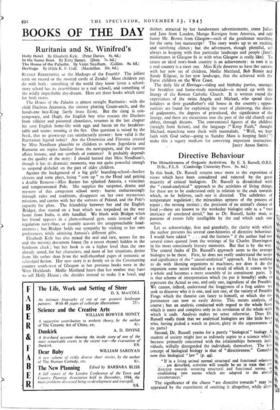BOOKS OF THE DAY
Ruritania and St. Winifred's
RUDOLF RASSENDYLL or the Madcaps of the Fourth? The jolliest term on record or the moated castle of Zenda? Most children can do with both : something of the world they know (even a school- story school has its resemblance to a real school), and something of the wildly improbable day-dream. Here are three books which cater for both tastes.
The House of the Paladin is almost straight Ruritania: with the child Duchess Anastasia, the sinister plotting Count-uncle, and the handsome boy-King (lately from Eton). But the slang is con- temporary, and Hugh, the English boy who rescues the Duchess from villainy and poisoned chocolates, resumes in the last chapter his cosy English home-life with eggs and bacon on the breakfast- table and scones toasting at the fire. One question is raised by the book, that no grown-up can satisfactorily answer: how valid is the Ruritanian legend today? Are the Ornowitza and Flavonia created by Miss Needham plausible to children to whom Jugoslavia and Rumania are topics familiar from the newspapers, and the current affairs lessons, and not symbols of romance? It probably depends on the quality of the story : I should hazard that Miss Needham's, though it has its dramatic moments, was not quite powerful enough to suspend disbelief on the part otolder children.
Against the background of a big girls' boarding-school—hockey elevens and term plays, being " sent up " to the Head and getting a double Remove—Miss Barnes has splashed Antosia, a vivacious and temperamental Pole. She supplies the suspense, drama and mystery of this competent school story: bursts embarrassingly through rules and traditions, disappears on her own mysterious missions, and carries with her the sorrows of Poland, and the Pole's capacity for plots. The friendship between her and the English Bridget, that started on a boat which was torpedoed on the way home from India, is ably handled. We blush with Bridget when her friend appears in a plum-coloured gym. tunic instead of the regulation navy-blue, or jauntily accosts the unapproachable head- mistress ; but)Bridget holds our sympathy by sticking to her own preferences, while admiring Antosia's different gifts.
Elisabeth Kyle has also mixed the real and rare, scones for tea and the missing document founa (by a secret rhyme) hidden in the heirloom clock ; but her book is on a higher level than the two already noted, for her characters, and most of her situations, derive from life rather than from the well-thumbed pages of romantic or schoolgirl fiction. Her new story is as firmly set in the Covenanting country south-west of Glasgow as her previous books were in the West Highlands. Mollie Maitland hears that her mother may have to sell Holly House ; she decides instead to make it a hotel, and
thither, attracted by her handwritten advertisements, come Julian and Jane from London, Mungo Kerrigan from America, and odd funny Mr. Brown from Glasgow—each of the gentlemen searching for the same lost manuscript! The story works up to an exciting
and satisfying climax; the adventures, though plentiful, are always in keeping with that particular landscape and people (Jane's misfortunes in Glasgow fit in with what Glasgow is really like). To create an ideal story-book country is an achievement : to root it in a real country is a rarer one. Miss Kyle deserves to have the success with her new set of children, Mollie Maitland, Bob Binnie and Sandy Kilgour, in her new landscape, that she achieved with the Furse children on the West Coast.
The daily life of Heritage—riding and birthday parties, sausages for breakfast and home-made marmalade—is mixed up with the liturgy of the Roman Catholic Church. It is written round the experiences of the twins Angela and Michael, who spend their holidays at their grandfather's old house in the country • oppor- tunities are found for explaining the story of plainsong, the duties of godparents, the degrees of priesthood, the significance of the liturgy, and there are excursions into the past of the old church and abbey, through dreams. The conventional figures of the children (straight from fiction), and the language (" Keep Faith," though; Michael, munching toast thick with marmalade. " Well, we kept faith with God today—going to Sunday Mass is keeping faith! ") make this a sugary medium for conveying important instruction.
JANET ADAM SMITH.


























 Previous page
Previous page